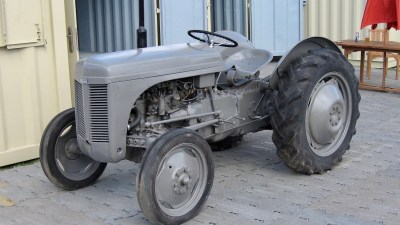Hardware hackers come from a variety of backgrounds, but among us there remains a significant number whose taste for making things was forged through growing up in a farm environment. If that’s you then like me it’s probable that you’ll melt a little at the sight of an older tractor, and remember pretending to drive one like it at pre-school age, and then proudly driving it for real a few years later before you were smart enough to realise you’d been given the tedious job of repeatedly traversing a field at a slow speed in the blazing sun. For me those machines were Ford Majors and 5000s, Nuffields, the ubiquitous red Fergusons, and usually relegated to yard duty by the 1970s, the small grey Ferguson TE20s that are in many ways the ancestor of all modern tractors.
The Black Art Of Mixing Your Own Fuel
There was something odd about some of those grey Fergies in the 1970s, they didn’t run on diesel like their newer bretheren, nor did they run on petrol or gasoline like the family Austin. Instead they ran on an unexpected mixture of petrol and heating oil, which as far as a youthful me could figure out, was something of a black art to get right. I’d had my first encounter with Tractor Vapour Oil, or TVO, a curious interlude in the history of agricultural engineering. It brings together an obscure product of the petrochemical industry, a moment when diesel engine technology hadn’t quite caught up with the on-farm requirement, and a governmental lust for a lower-tax tractor fuel that couldn’t be illicitly used in a car.
TVO is a fuel with a low octane rating, where the octane rating is the resistance to ignition through compression alone. In chemical terms octane rating a product of how many volatile aromatic hydrocarbons are in the fuel, and to illustrate it your petrol/gasoline has an octane rating in the high 90s, diesel fuel has one close to zero, and TVO has a figure in the 50s. In practice this was achieved at the refinery by taking paraffin, or kerosene for Americans, a heavier fraction than petrol/gasoline, and adding some of those aromatic hydrocarbons to it. The result was a fuel on which a standard car engine wouldn’t run, but which would run on a specially low-compression engine with a normal spark ignition. This made it the perfect tax exempt fuel for farmers because it could only be used in tractors equipped with these engines, and thus in the years after WW2 a significant proportion of those Fergies and other tractors were equipped to run on it.
When Diesels Were Still Slow-Revving
One might ask why post war tractors were not simply equipped with diesel engines, and the answer there comes with the state of diesel engine development in the mid-century. It’s easy to make a large diesel engine which can run at constant slow revs, but at the time it was not so easy to make one which was small, powerful, and responsive at different speeds. Thus there were tractors with huge single-cylinder diesels running their entire length which used to rock backwards and forwards with the revolution of their engines, but farmers would have to wait for widespread adoption of the swirl chamber on diesel engines through the 1950s before they’d get their responsive and higher-revving diesel tractors.

It was in this window from the late 1940s into the 1950s then, that TVO was the farm fuel of the moment, until a new breed of diesel machines from the mid-50s onward made it less attractive. I can’t find a reference to when the last TVO tractor rolled off the production line, but the fuel was withdrawn from the UK market in 1974.
That was about the time a pre-school me was gazing up at my dad’s diesel Fordson Major, and our neighbour was mixing up fake TVO for his yard tractor. As far as I am aware the UK government still frowns upon illicit fuel mixing so there are official licenses to make your own TVO, and I understand the owners association for the grey Fergie has one so those over-restored examples at the village fete aren’t breaking the law.
I may no longer have a direct connection with farming, but I still from time to time get to sit in the cab of a modern tractor whose computer controlled turbo diesel engine and near-perfect transmission are up to any task. These machines are as far as it goes, perfected. But there’s still part of me that’s more at home with a clutch and two gear levers, and the sulphurous tang of 1970s tractor exhaust mixed with the smell of freshly turned earth. I must stay away from Farmer’s Weekly, or I could find myself mixing TVO for myself.
